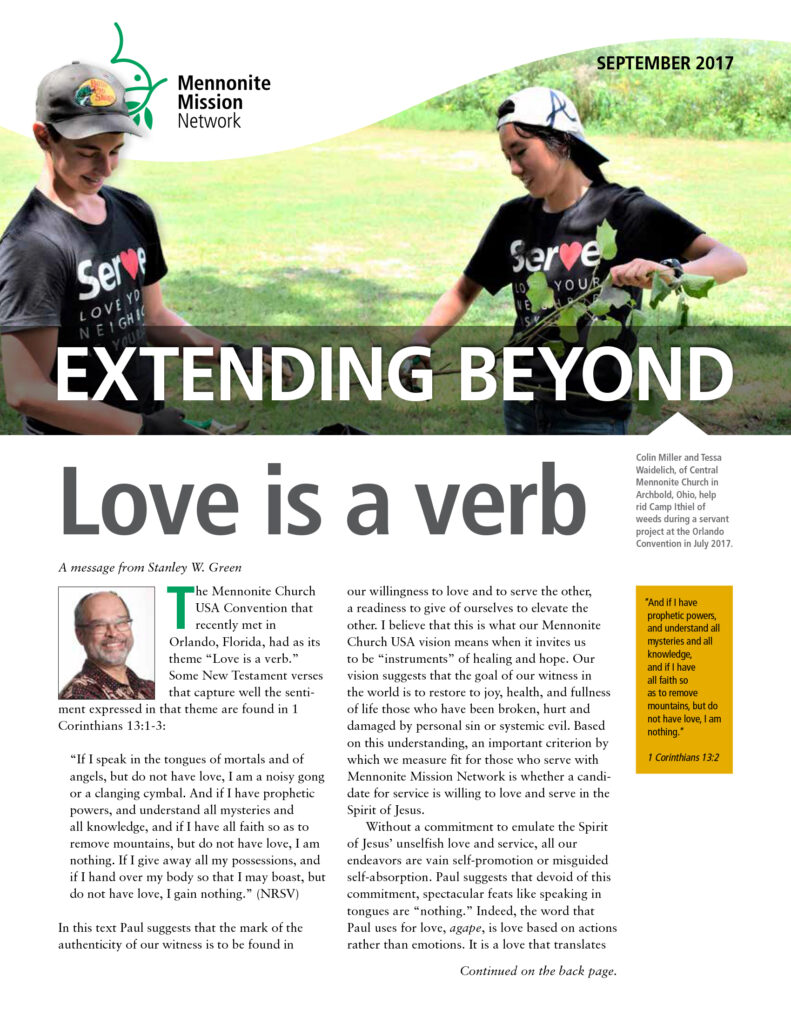The Mennonite Church USA Convention that recently met in Orlando, Florida, had as its theme “Love is a verb.” Some New Testament verses that capture well the sentiment expressed in that theme are found in 1 Corinthians 13:1-3:
“If I speak in the tongues of mortals and of angels, but do not have love, I am a noisy gong or a clanging cymbal. And if I have prophetic powers, and understand all mysteries and all knowledge, and if I have all faith so as to remove mountains, but do not have love, I am nothing. If I give away all my possessions, and if I hand over my body so that I may boast, but do not have love, I gain nothing.” (NRSV)
In this text Paul suggests that the mark of the authenticity of our witness is to be found in our willingness to love and to serve the other, a readiness to give of ourselves to elevate the other. I believe that this is what our Mennonite Church USA vision means when it invites us to be “instruments” of healing and hope. Our vision suggests that the goal of our witness in the world is to restore to joy, health, and fullness of life those who have been broken, hurt and damaged by personal sin or systemic evil. Based on this understanding, an important criterion by which we measure fit for those who serve with Mennonite Mission Network is whether a candidate for service is willing to love and serve in the Spirit of Jesus.
Without a commitment to emulate the Spirit of Jesus’ unselfish love and service, all our endeavors are vain self-promotion or misguided self-absorption. Paul suggests that devoid of this commitment, spectacular feats like speaking in tongues are “nothing.” Indeed, the word that Paul uses for love, agape, is love based on actions rather than emotions. It is a love that translates words and intent into deeds that reinforce the value and dignity of the person loved.
Not only are professed ability and mere intent insufficient evidence of our love and sincerity, they are also a scathing indictment of our failure to translate capacity and desire into authentic action. For almost two decades in Lithuania, Robin Gingerich has incarnated this approach of Christ-shaped service that finds its wellspring in seeking to lift up the other—in actions that liberate and equip the other to realize the fullness of their human potential.
This disposition is given expression in a report from Jane and Jerrell Ross Richer, who are serving with Mennonite Mission Network in the Ecuadorian rain forest. Jane and Jerrell wrote about asking an indigenous pastor with whom they serve, “What do indigenous communities require of missionaries who come to work alongside them?” Pastor Clever Mashiant, to whom the question was posed, responded with these words, “You must sit down, so we can stand up.” In other words, Pastor Clever seemed to suggest, in the Christian companionship of Western mission workers with indigenous Christians in Latin America, the posture of those from the West must not be about their agenda or ambitions or, even yet, their sense of what they feel called to do. Their posture must instead be shaped by the kind of Christ-like love that looks beyond their own personal needs, and the coveted self-actualizations of their sense of purpose, to actions that ensure the fullness of life and enhancement of the dignity and freedom of those among whom they serve.
Serving in partnership with our sisters and brothers in our global Christian family is a privilege. Wherever this happens, we aim to point people to God’s good news incarnate in Jesus. We pray that our witness might emulate the spirit of love and unselfish service that Jesus modeled for us. We praise God for those like Robin Gingerich and the Ross Richer family who seek to imitate the model of Christ.
Finally, I thank you for your sharing, which makes it possible for us to send mission workers like these, and so many others, to be instruments of God’s healing and hope around the world.
Stanley W. Green
Executive Director


